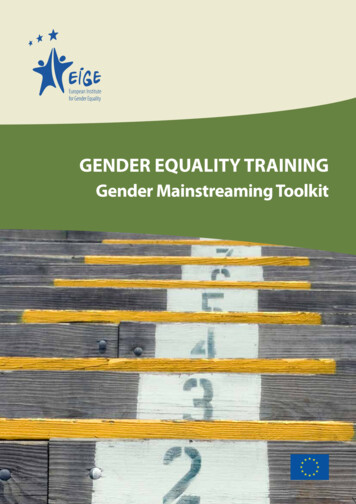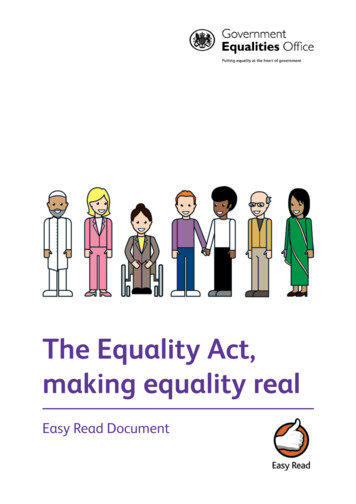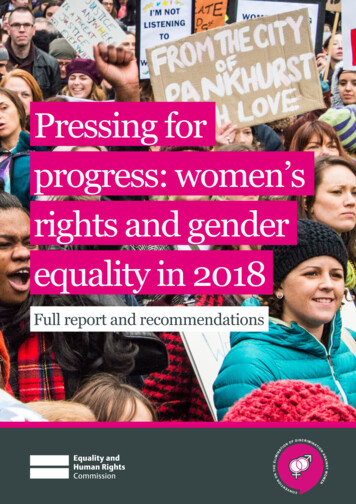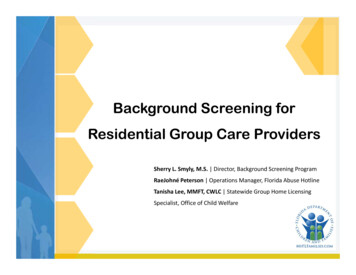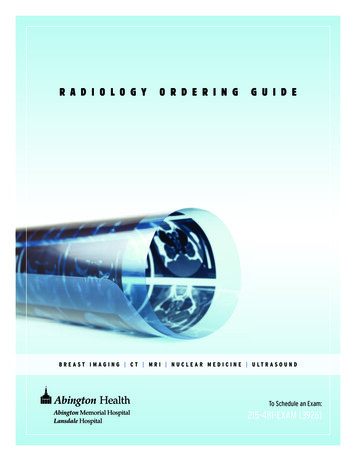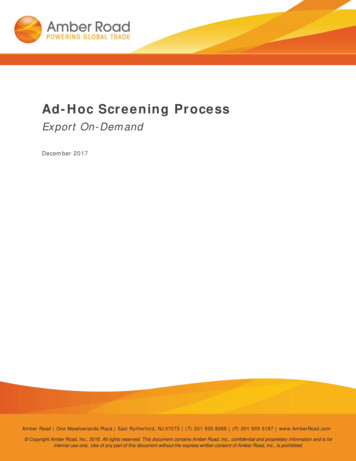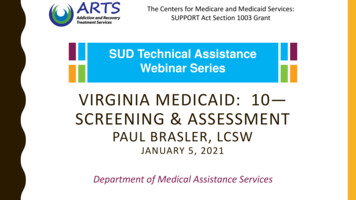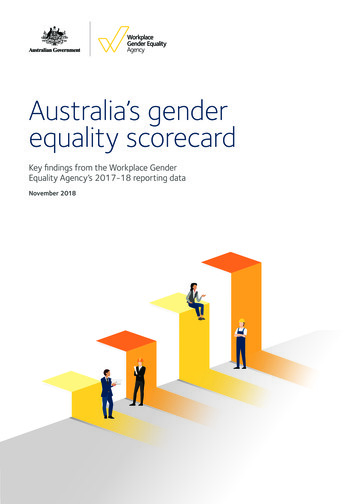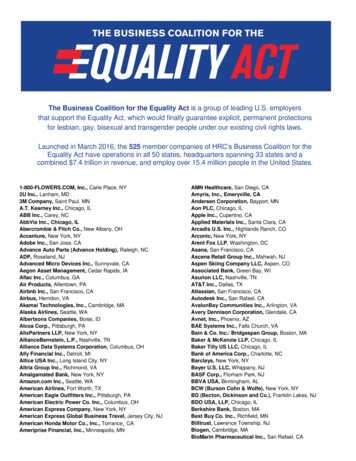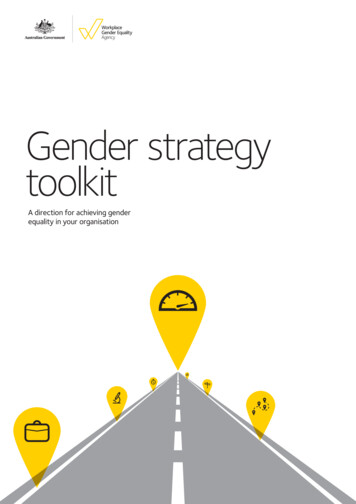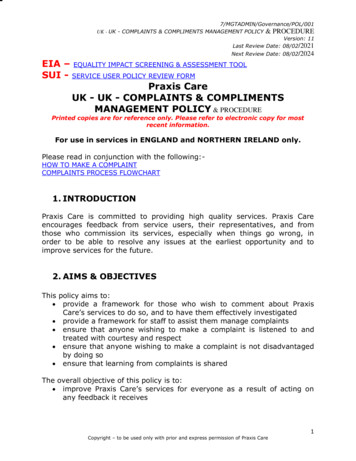
Transcription
7/MGTADMIN/Governance/POL/001UK - UK - COMPLAINTS & COMPLIMENTS MANAGEMENT POLICY & PROCEDUREVersion: 11Last Review Date: 08/02/2021Next Review Date: 08/02/2024EIA – EQUALITY IMPACT SCREENING & ASSESSMENT TOOLSUI - SERVICE USER POLICY REVIEW FORMPraxis CareUK - UK - COMPLAINTS & COMPLIMENTSMANAGEMENT POLICY & PROCEDUREPrinted copies are for reference only. Please refer to electronic copy for mostrecent information.For use in services in ENGLAND and NORTHERN IRELAND only.Please read in conjunction with the following:HOW TO MAKE A COMPLAINTCOMPLAINTS PROCESS FLOWCHART1. INTRODUCTIONPraxis Care is committed to providing high quality services. Praxis Careencourages feedback from service users, their representatives, and fromthose who commission its services, especially when things go wrong, inorder to be able to resolve any issues at the earliest opportunity and toimprove services for the future.2. AIMS & OBJECTIVESThis policy aims to: provide a framework for those who wish to comment about PraxisCare’s services to do so, and to have them effectively investigated provide a framework for staff to assist them manage complaints ensure that anyone wishing to make a complaint is listened to andtreated with courtesy and respect ensure that anyone wishing to make a complaint is not disadvantagedby doing so ensure that learning from complaints is sharedThe overall objective of this policy is to: improve Praxis Care’s services for everyone as a result of acting onany feedback it receives1Copyright – to be used only with prior and express permission of Praxis Care
7/MGTADMIN/Governance/POL/001UK - UK - COMPLAINTS & COMPLIMENTS MANAGEMENT POLICY & PROCEDUREVersion: 11Last Review Date: 08/02/2021Next Review Date: 08/02/20243. DEFINITIONFor the purposes of this policy a complaint is:an expression of dissatisfaction (communicated verbally, electronically, or inwriting) and whether justified or not, which requires a response. There is nodifference between a ‘formal’ complaint and an ‘informal’ complaint. Both areexpressions of dissatisfaction.4. SCOPEThis policy and procedure should be used by any service user, theirrepresentative, commissioner or supplier to comment on the quality ofPraxis Care’s services.This policy and procedure should be read and understood by all Praxis Careemployees, volunteers and students on placement.5. EXCLUSIONS5.1 Anti-Social BehaviourA report of anti-social behaviour from a service user or neighbour aboutanother service user is not a complaint about Praxis Care. In such instances,all incidents of nuisance, or anti-social behaviour should be reported to theowner/landlord of the relevant property to be managed under the terms ofthe relevant policy or the person’s licence/tenancy agreement.5.2 Property MaintenanceWhere Praxis Care is not the owner, managing agent or landlord responsiblefor maintaining the property, a report received which relates to a propertyissue should not be recorded as a complaint against Praxis Care. In suchinstances, all property maintenance issues should be reported to theappropriate landlord/owner for action and resolution. Staff should supportthe service user appropriately to speak to the relevant owner/landlord of theproperty.Where Praxis Care is the owner, managing agent or landlord of the property,a report of a property maintenance issue is also not a complaint, it is a2Copyright – to be used only with prior and express permission of Praxis Care
7/MGTADMIN/Governance/POL/001UK - UK - COMPLAINTS & COMPLIMENTS MANAGEMENT POLICY & PROCEDUREVersion: 11Last Review Date: 08/02/2021Next Review Date: 08/02/2024request for a service and should be recorded and managed in line with therelevant Repairs Policy.On occasions it may be appropriate for a complaint to be made in respect ofproperty maintenance. For example, if a request for a repair was made inline with the relevant Repairs Policy, but the repair was not carried outwithin the timeframe promised or not carried out well. On this occasion itwould be appropriate for a complaint to be made that the service providedwas not as expected.5.3 Concerns of AbuseA concern may be reported, which, on further consideration, relates tosafeguarding. In such instances, the concern should be managed andresolved under the relevant safeguarding policy and procedures, rather thanthis Complaints Management Policy.5.4 Staff ConcernsThis policy is not to be used by employees raising an issue or concern. Staffmembers with a concern should first raise it with their line manager andattempt to resolve it informally. If, following discussion with the manager,either informally or in supervision, a staff member feels the issue has notbeen resolved, it should be brought to the attention of the appropriate Headof Operations.Staff should refer to: the GRIEVANCE PROCEDURE where they have an issue about theiremployment, treatment, or terms and conditions which has not beenresolved informally with the line manager. the CAPABILITY POLICY where they have concerns about a colleague’sconduct/performance, which have not been resolved informally. the WHISTLEBLOWING POLICY where the employee is concerned aboutdangers or wrong-doing that affect others and which has not been fullyaddressed locally at scheme level.In any of these cases, the employee should raise the issue firstly with theirline manager to enable a swift local resolution where possible.3Copyright – to be used only with prior and express permission of Praxis Care
7/MGTADMIN/Governance/POL/001UK - UK - COMPLAINTS & COMPLIMENTS MANAGEMENT POLICY & PROCEDUREVersion: 11Last Review Date: 08/02/2021Next Review Date: 08/02/20246. ROLES AND RESPONSIBILITIES6.1. Chief ExecutiveThe Chief Executive has overall responsibility for the process of complaintsmanagement and application of the complaints policy.6.2. DirectorsDirectors have delegated responsibility for ensuring the efficient andeffective implementation of the Complaints Management Policy andProcedure within their area of responsibility.6.3. Head of OperationsHeads of Operations are responsible for ensuring that staff are aware of theComplaints Management Policy and Procedure and assist in building a culturewhere feedback of any type is welcomed and encouraged. Heads ofOperations have a duty to ensure that, where they have been involved in aninvestigation, an action plan is produced and completed within an agreedtimescale and copied to the Complaints Master File.6.4. ManagersThe Project Manager will ensure that all complaints received locally areactioned appropriately.Managers have a responsibility to ensure that staff are aware of theComplaints Management Policy and Procedure. They have a responsibility toencourage a culture where a positive approach to learning from the resultsof service user feedback, concerns and complaints is fostered.Managers must contact Praxis Care’s Safeguarding Champion, at the earliestopportunity, if the complaint relates to a safeguarding concern.Managers must contact the HR Department, at the earliest opportunity,where a complaint has been made concerning a member of staff, or where acomplaint could potentially lead to disciplinary action, and take guidancefrom the HR Department where necessary.4Copyright – to be used only with prior and express permission of Praxis Care
7/MGTADMIN/Governance/POL/001UK - UK - COMPLAINTS & COMPLIMENTS MANAGEMENT POLICY & PROCEDUREVersion: 11Last Review Date: 08/02/2021Next Review Date: 08/02/20246.5. All StaffAny staff member may be the first recipient of a concern or complaint from aservice user, carer or service user representative. Therefore, best practice incustomer care and management of informal concerns and complaints isevery staff member’s responsibility.It is the responsibility of all staff to work to resolve any concerns expressedby service users or their representatives, and to escalate to their managerany concern which cannot be resolved immediately.6.6. The Complaints OfficerPraxis Care has a nominated Complaints Officer (Director of Quality &Governance). The Complaints Officer is responsible to the Chief Executive forimplementing, delivering and monitoring of the Complaints & ComplimentsManagement Policy and Procedure.The Complaints Officer must be informed of all complaints received. Staffshould use the on-line Complaint Form on which to record complaints.The Complaints Officer is responsible for ensuring that an investigatingofficer is appointed to deal with any complaint which has not been resolvedlocally at Stage One.The Complaints Officer will present a report to the Governance Committeewhich details the number and type of complaint for each service, a statusreport on any resolved complaints, trends in complaints, and a summary ofany organisation learning resulting from any complaint.6.7. Governance CommitteeThe Governance Committee will oversee and review the management of theorganisation’s complaints processes. At each meeting it will review complainttrends and seek assurances that complaints have been managed inaccordance with Praxis Care policy. The Governance Committee will alsoreview any unresolved complaints and enquire about their status.6.8. HR DepartmentThe HR Department will provide guidance where a complaint has been madeconcerning a member of staff, or where a complaint could potentially lead todisciplinary action.5Copyright – to be used only with prior and express permission of Praxis Care
7/MGTADMIN/Governance/POL/001UK - UK - COMPLAINTS & COMPLIMENTS MANAGEMENT POLICY & PROCEDUREVersion: 11Last Review Date: 08/02/2021Next Review Date: 08/02/20247. COMPLAINTS POLICY7.1. Openness, Transparency & CandourPraxis Care will operate its Complaints Policy on the basis of openness,transparency and candour: Openness – enabling concerns and complaints to be raised freelywithout fear.Transparency – allowing information about performance andoutcomes to be shared with staff, service users, the public andregulators.Candour – any individual harmed by the provision of service isinformed of the fact and an appropriate remedy offered, regardless ofwhether a complaint has been made or a question asked about it.7.2. Complaints ManagementPraxis Care’s policy in relation to the management of complaints to: Take all complaints seriously.Inform people about the process and make information readilyavailable in accessible formats.Make the process simple and enable people to make a complaint in away that suits them, at a time convenient to them and with theimmediate reassurance that the issue will be taken seriously.Train staff to be receptive and supportive of feedback and complaints,to have the skills to manage complaints and to be empowered toresolve issues promptly and effectively.Investigate and respond to complaints within 28 days, and if this is notpossible, ensure the complainant is kept informed (every 28 days) ofthe reasons for any delays.Keep the complainant informed of progress in a timely manner, wherepossible providing anonymity if requested.Ensure the views of the complainant are taken into account whenexploring remedial actions.Provide outcomes/resolutions that directly address the complaint, in amanner the complainant prefers and by an appropriate person.6Copyright – to be used only with prior and express permission of Praxis Care
7/MGTADMIN/Governance/POL/001UK - UK - COMPLAINTS & COMPLIMENTS MANAGEMENT POLICY & PROCEDUREVersion: 11Last Review Date: 08/02/2021Next Review Date: 08/02/2024 Adopt an open, learning culture where complaints and feedback areactively encouraged and recognized as opportunities to reflect andimprove service provisions locally and organisationally.Inform the complainant of their options in the event that they are notsatisfied with the outcome of their complaint.7.3. Complaints and External InvestigationsThis policy will not normally continue where an external investigation isinvestigating the same concern. In the event that an external investigation,a Safeguarding investigation, or a police investigation is underway, thecomplaint may be put ‘on hold’ by Praxis Care, and the complainantinformed of this.Praxis Care will liaise, as much as is practical, with the co-ordinator of anyexternal investigation to enable the complaint to be resolved at the earliestopportunity. If a legal view is needed on consideration of a complaint, theDirector of Care (Governance) should be contacted.7.4. Confidentiality & ConsentInformation about complaints and those involved is strictly confidential. Anyinformation should only be disclosed to those with a demonstrable need toknow, in line with the relevant Data Protection legislation.If someone makes a complaint on behalf of a service user, staff must clarifywith the service user that he/she has given consent for the complainant todo so. Information about a service user should not be shared with anyonewithout the consent of the service user.7.5. AdvocacyIn some instances, advocates are an important support to a service user inassisting him / her to make a complaint and guiding the individual throughthe complaints process. Praxis Care should ensure that the service user isaware of the contact details of advocacy services in the local area. Pleaseread: ACCESSING OTHER SERVICES.7.6. TrainingAll staff involved in any aspect of operational services will be provided withtraining on Complaints Management. Staff should attend refresher training7Copyright – to be used only with prior and express permission of Praxis Care
7/MGTADMIN/Governance/POL/001UK - UK - COMPLAINTS & COMPLIMENTS MANAGEMENT POLICY & PROCEDUREVersion: 11Last Review Date: 08/02/2021Next Review Date: 08/02/2024every 5 years. Details of the course aims and objectives can be located inTRAINING PROGRAMME AIMS & OBJECTIVES.8. COMPLIMENTS POLICYFor the purposes of this policy a compliment is defined as an: ‘Expression ofappreciation either verbally, or by letter, card, gift or donation.’Compliments are as important to Praxis Care as complaints and should beseen as a means of learning how things have gone well. It is always helpfulto hear how people think about the organisation and the services it provides.People are encouraged when they are complimented on their work. If acompliment is received about any aspect of Praxis Care it should be sharedwith all those involved.Compliments are important because: They can help influence the policy and decisions of the organisation They can help maintain the standards of our services They can raise issues of real importance and can lead to change forthe better They enable inspectors to monitor and evaluate the safety and qualityof the service They provide a quality indicator which can be used by commissioners,individuals and their families, and regulators to measure the quality ofthe service and to provide evidence of outcomes.Compliments should be recorded on the online compliment form andevidence of submission i.e. the confirmation email, printed and filed locallyfor quality monitoring purposes.Letters of appreciation/compliments, cards, etc. should also be filed assupporting evidence, with the confirmation email.Compliments should be a standing item on team meeting agendas.Compliments are monitored monthly through the Head of Operationsmonthly monitoring visit report (MMVR).9. ight – to be used only with prior and express permission of Praxis Care
7/MGTADMIN/Governance/POL/001UK - UK - COMPLAINTS & COMPLIMENTS MANAGEMENT POLICY & PROCEDUREVersion: 11Last Review Date: 08/02/2021Next Review Date: 08/02/2024An Information Guide COMPLAINTS AND COMMENTS has been developed forservice users, to accompany this policy and procedure. It providesinformation about all aspects of Praxis Care’s complaints procedures as wellas additional information. It directs service users and/or theirrepresentatives to advice and guidance services, regulatory bodies,advocacy services and ombudsman services. These resources must be madeavailable to all service users and representatives on commencement ofservice and on request. Information on how to make a complaint must alsobe made available to all relevant parties on request.10.COMPLAINTS & COMPLIMENTS MONITORING10.1. Monthly Monitoring VisitsThe number and nature of complaints and compliments will be monitored ona monthly basis in each scheme by the Head of Operations as part of theMonthly Monitoring Visit Report.10.2. Operational Governance Meetings & Governance CommitteeComplaints and compliments will be monitored and evaluated by theGovernance Committee, a Sub-Committee of the Board, which meets everytwo months. The Complaints Officer will submit a report to this Committee.In advance of the Governance Committee, the Operational GovernanceMeeting will also review the management of complaints, the effectiveness ofthe policy, and any trends that have been identified.10.3. Management ReviewA Management Review Meeting, held twice yearly, comprising the SeniorLeadership Team, will be held which will evaluate the trends and learningfrom complaints and compliments. The Quality and Governance Departmentwill submit a report to this meeting.11. ROLE OF REGULATORY BODIES, OMBUDSMEN ANDCOMMISSIONERS11.1. Commissioners9Copyright – to be used only with prior and express permission of Praxis Care
7/MGTADMIN/Governance/POL/001UK - UK - COMPLAINTS & COMPLIMENTS MANAGEMENT POLICY & PROCEDUREVersion: 11Last Review Date: 08/02/2021Next Review Date: 08/02/2024Service users can contact the Complaints Officer or Service Manager in thelocal Health and Social Services Trusts of Local Authority. The commissionerinvolved will have a procedure in relation to dealing with complaints fromservice users receiving a service from a provider organisation.11.2. England11.2.1. CQC – Care Quality CommissionWhere the complainant is not satisfied with the response from theIndependent Review Panel, he may decide to inform the regulatory body –Care Quality Commission. Whilst CQC cannot investigate the complaint, itcan use the information received when it is inspecting services to ensurethat the services are meeting standards of quality and safety. However,complaints from people whose rights are restricted under the Mental HealthAct, or their representatives, about the way staff have used their powersunder the Act, can be investigated by CQC.11.2.2. OfstedOfsted welcomes complaints in relation to children’s services. Service usersand/or their representatives can contact Ofsted who will investigate whetherthe relevant requirements and regulations are being met.11.2.3. Health and Care Professions CouncilService users, carers or the general public can make a complaint to theHCPC about a Registered Social Worker. The HCPC have a duty toinvestigate complaints as Registered Social Workers are expected to abideby the Codes of Practice for Social Workers.11.2.4. Parliamentary and Health Service OmbudsmanAnyone can complain to the Ombudsman about the services provided bygovernment departments, a range of public bodies in the UK and the NHS inEngland. The Ombudsman provides a service to the public to undertakeindependent investigations into complaints.11.3. Northern Ireland11.3.1. RQIA – Regulation and Quality Improvement Authority10Copyright – to be used only with prior and express permission of Praxis Care
7/MGTADMIN/Governance/POL/001UK - UK - COMPLAINTS & COMPLIMENTS MANAGEMENT POLICY & PROCEDUREVersion: 11Last Review Date: 08/02/2021Next Review Date: 08/02/2024The regulatory body RQIA advise that in the first instance complaints shouldbe resolved with the organisation providing the service. Where a complaintto RQIA highlights a failure to comply with regulations or minimumstandards, these are followed up through RQIA’s inspection activity.The Regulation and Quality Improvement Authority is located at:9th Floor Riverside Tower5 Lanyon PlaceBELFASTBT1 3BTEmail: info@rqia.org.ukTelephone: 028 9536 1111 (Switchboard is manned 9am - 5pm Monday toFriday)11.3.2. NISCC – Northern Ireland Social Care CouncilService users, carers, employers or the general public can make a complaintabout a registered social care worker. NISCC will investigate a complaintabout the specific behaviour of a registered social care worker which doesnot meet the standards set out in the NISCC Code of Practice for Social CareWorkers. NISCC can also be contacted about the conduct of a Social CareWorker that is not yet registered.The NISCC is located at:7th Floor Millennium House19-25 Great Victoria StreetBelfastBT2 7AQEmail: info@niscc.hscni.netTelephone: 028 9536 260011.3.3. Northern Ireland OmbudsmanAnyone can complain to the Ombudsman if they are unhappy with theservice provided by a government department/agency or public body. Publicbodies include all local councils, education and library boards, organisationsproviding Health and Social Care (HSC) Services and prison healthcare.The NI Ombudsman is located at:11Copyright – to be used only with prior and express permission of Praxis Care
7/MGTADMIN/Governance/POL/001UK - UK - COMPLAINTS & COMPLIMENTS MANAGEMENT POLICY & PROCEDUREVersion: 11Last Review Date: 08/02/2021Next Review Date: 08/02/2024Progressive House33 Wellington PlaceBelfast, BT1 6HNEmail: nipso@nipso.org.ukTelephone: 028 90233821 or freephone 0800 34342411.3.4. Patient Client CouncilThe Patient Client Council provides a Complaints Support Service offeringfree and confidential advice and support to anyone wishing to make acomplaint about any Health and Social Care service.The Patient Client Council is located at:The Patient and Client Council2nd Floor, Centre House79 Chichester StreetBelfastBT1 4JEEmail: complaint.pcc@hscni.netTelephone: 0800 917 022212.LEGISLATIONAll regulated services must operate a complaints procedure. Health and Social Care Act 2008 (Regulated Activities) Regulations 2010(England), Regulation 19 & Regulation 20The Residential Care Homes Regulations (NI) 2005, Regulation 24.The Children’s Home Regulations (NI) 2005, Regulation 23.The Day Care Setting Regulations (NI) 2007, Regulation 24.The Domiciliary Care Agencies Regulations (NI) 2007, Regulation 22.Regulation of Care Act, 2013, (IoM)13. REFERENCESThe Local Authority Social Services andComplaints (England) Regulations 2009.NationalHealthService12Copyright – to be used only with prior and express permission of Praxis Care
7/MGTADMIN/Governance/POL/001UK - UK - COMPLAINTS & COMPLIMENTS MANAGEMENT POLICY & PROCEDUREVersion: 11Last Review Date: 08/02/2021Next Review Date: 08/02/2024 Complaints in Health and Social Care – Standards and Guidelines forResolution and Learning. DHSSPSNI (2009).‘Listening, Responding, Improving – a Guide to Better Customer Care’(DH 2009).‘Your Service, Your Say’, Complaints Policy & Procedures Manual, HSE,2009A Patient’s Guide, NHS Complaints Procedure, Department of Health, Isleof Man, 2012.A Review of Concerns (Complaints) Handling in Wales, June 2014.Being Open, National Patient Safety Agency, 200913Copyright – to be used only with prior and express permission of Praxis Care
7/MGTADMIN/Governance/POL/001UK - UK - COMPLAINTS & COMPLIMENTS MANAGEMENT POLICY & PROCEDUREVersion: 11Last Review Date: 08/02/2021Next Review Date: 08/02/202414.COMPLAINTS PROCEDUREPraxis Care’s Complaints Procedure comprises of 3 stages: Stage 1 – Local Resolution (Scheme/Department)Stage 2 – Formal Investigation (Head Of Operations Level)Stage 3 – Independent Review (Director Level)14.1. STAGE ONE - LOCAL RESOLUTIONAny member of staff may receive an expression of dissatisfaction; andwhether written or oral, it must be addressed promptly and in a professionalmanner.14.1.1. Receiving a ComplaintService users and their representatives should be assured that all feedbackis greatly appreciated, that they will not be disadvantaged in any way, andthat there will be no retribution for making a complaint. Staff should explainthe complaints procedure and provide a copy of the COMPLAINTS ANDCOMMENTS leaflet.The individual should also be asked how he / she would like the complaint tobe resolved.If a complaint is being made on behalf of a service user by a carer oradvocate, it must first be verified that the person has permission to speakfor the service user. If staff are in doubt, it should be assumed that theservice user’s explicit permission is needed prior to discussing the complaintwith the advocate.14.1.2. Reporting a ComplaintEmployees should take steps to resolve complaints immediately, agreeingthe course of action with the complainant at the time and in person. Whereremedial action cannot be facilitated, the employee’s line manager should beinformed without delay. The Project Manager will ensure that all complaintsreceived locally are actioned appropriately.14Copyright – to be used only with prior and express permission of Praxis Care
7/MGTADMIN/Governance/POL/001UK - UK - COMPLAINTS & COMPLIMENTS MANAGEMENT POLICY & PROCEDUREVersion: 11Last Review Date: 08/02/2021Next Review Date: 08/02/2024The person dealing with the complaint should not be directly involved in thematters of the complaint or be the subject of the complaint. If the manageris the subject of the complaint, the complaint should be referred to PraxisCare’s Complaints Officer / or relevant Director of Care to appoint anappropriate person to deal with the complaint.14.1.2.1Safeguarding ConcernsManagers must contact Praxis Care’s Safeguarding Champion, at the earliestopportunity, if the complaint relates to a safeguarding concern.14.1.2.2.Staff ConductManagers must contact the HR Department, at the earliest opportunity,where a complaint has been made concerning a member of staff, or where acomplaint could potentially lead to disciplinary action, and take guidancefrom the HR Department where necessary.14.1.3.Recording a ComplaintWhere an individual wishes for an issue to be treated as a complaint, theemployee must, at the earliest opportunity, record the complaint and actionstaken on the on-line complaint form located in the Q&G MIS. If thecomplaint can be resolved immediately then it should be marked as ‘closed’at the time it is logged on the on-line form. If the complaint requiresinvestigation, it should be recorded as ‘open’ on the on-line form.If an individual wishes to write the complaint, he or she should be given theCOMPLAINT FORM on which to record the complaint. The individual shouldthen be advised to give the form to the Project Manager to deal with. TheProject Manager will ensure that all complaints received locally are actionedappropriately.14.1.4. Communication with the ComplainantStaff should make every effort to obtain the complainant’s postal address,email address and contact details as soon as possible, to enable contact tobe maintained during the investigation and to enable feedback to be given tothe complainant once the complaint is resolved.Following receipt of a complaint, initial communication with the complainantshould take place within 2 working days, and preferably be verbal via phone15Copyright – to be used only with prior and express permission of Praxis Care
7/MGTADMIN/Governance/POL/001UK - UK - COMPLAINTS & COMPLIMENTS MANAGEMENT POLICY & PROCEDUREVersion: 11Last Review Date: 08/02/2021Next Review Date: 08/02/2024or in person, unless the complainant cannot be contacted directly or hasrequested another means of correspondence. Where a contact number is notprovided by the complainant, a letter of acknowledgement will be issuedwithin 5 working days.A record of all communication with the complainant should be maintained bythe person investigating the complaint.If the complaint is received directly by the Complaints Officer, he/she (orsomeone with delegated responsibility) will log it on the online form andallocate a suitable representative to contact the complainant directly viaphone (within 5 working days) to talk through the concern and agree thecourse of action, including the process of investigating the complaint.Where a contact number is not provided by the complainant, a letter ofacknowledgement will be issued within 5 working days.The member of staff dealing with the complaint should fully investigate it,and complete a report with findings, within 28 days.If this is not possible, the member of staff dealing with the complaint shouldensure the complainant is kept informed (every 28 days) of the reasons forany delays, until the complaint is resolved.The person dealing with the complaint should discuss the findings of theinvestigation with the complainant to ascertain that he/she is satisfied withPraxis Care’s response.14.1.5. Closing a Complaint at Stage OneWhen a complaint has been investigated it is important that the complainantis given feedback (either verbally or written) on the organisation’s responseto their complaint.This feedback will: inform the complainant that their complaint has been investigated andoutline the actions taken in response inform the complainant that the complaint is now considered closed advise the complainant of their rights in the event that they are notsatisfied with the response16Copyright – to be used only with prior and express permission of Praxis Care
7/MGTADMIN/Governance/POL/001UK - UK - COMPLAINTS & COMPLIMENTS MANAGEMENT POLICY & PROCEDUREVersion: 11Last Review Date: 08/02/2021Next Review Date: 08/02/2024Where a complaint has been received in writing a written closure letter willbe sent to the complainant containing this feedback. The corporate closureletter template should be used and can be requested from the Complaintsemail address.The letter will be drafted by the Investigating Officer and the appropriateOperational Head, and forwarded to the relevant Operational Director forreview. Once the content has been approved by the relevant Director, thewritten response will be issued to the complainant by the person whoinvestigated the complaint.Once the complaint has been addressed, the Complaints Officer should beupda
Praxis Care has a nominated Complaints Officer (Director of Quality & Governance). The Complaints Officer is responsible to the Chief Executive for implementing, delivering and monitoring of the Complaints & Compliments Management Policy and Procedure. The Complaints Officer must be informed of all complaints received. Staff
